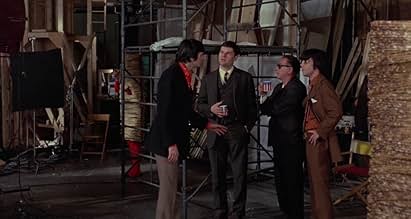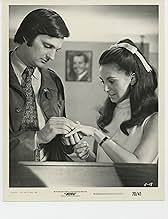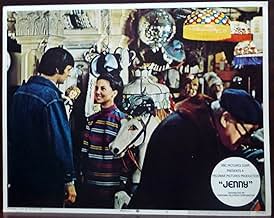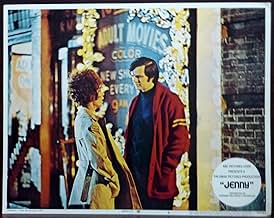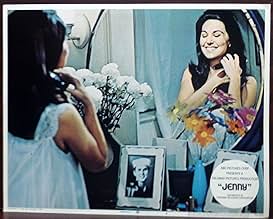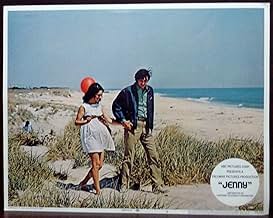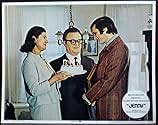Ajouter une intrigue dans votre langueAn unwed mother-to-be marries a total stranger who is avoiding the draft. She now has a father for her child, and he doesn't have to join the Army--but their marriage of convenience soon bec... Tout lireAn unwed mother-to-be marries a total stranger who is avoiding the draft. She now has a father for her child, and he doesn't have to join the Army--but their marriage of convenience soon becomes true romance.An unwed mother-to-be marries a total stranger who is avoiding the draft. She now has a father for her child, and he doesn't have to join the Army--but their marriage of convenience soon becomes true romance.
- Réalisation
- Scénario
- Casting principal
- Récompenses
- 1 nomination au total
Fay Bernardi
- Woman on Bus
- (non crédité)
Robby Galvin
- Boy
- (non crédité)
Max D. Hoffman
- Baby
- (non crédité)
Timothy Ousey
- Boy
- (non crédité)
Florence Stanley
- Woman at Playground
- (non crédité)
Avis à la une
The less said, the better. Even worse than Clint Eastwood's THE BEGUILED.
To some who were either in soggy diapers or not even born, this movie lacks. However, getting out of the draft was a daily affair back in 1970. Even the most staunch supporters of "The War" admitted that Viet Nam or "Nam" was a one way ticket to mud, blood and gore.The direct method was to go to Canada which left some friends? and neighbors spitting mad. Having a child (no matter how or where) was VERY acceptable. The prevailing public feeling was that the chances of returning in one piece from 'Nam was not good.
Many of the people that were very directly affected by Viet Nam, during that time period, were a mess. Their actions seemed disjointed and their lives lacked many of the characteristics of what we now call normal living. It was a time of such uncertainty, and day to day confrontations that life is fragile and gone too quickly. This movie, in part, represents that time in a story form.
Many of the people that were very directly affected by Viet Nam, during that time period, were a mess. Their actions seemed disjointed and their lives lacked many of the characteristics of what we now call normal living. It was a time of such uncertainty, and day to day confrontations that life is fragile and gone too quickly. This movie, in part, represents that time in a story form.
Marlo Thomas plays Jenny, a single, naïve working girl living on her own who has managed to get herself pregnant (she was afraid of asking her family doctor for birth control pills, but since she doesn't live at home anymore this seems like a flimsy excuse). She's intent on raising the child alone until she meets a director of commercials in the park who has 30 days before he'll be inducted involuntarily into the Army. They go out on a date, realize they're both in a jam, and he proposes marriage--to him, it's just a way to dodge the draft (he already has a steady girlfriend), but she wants to feel like a real bride. George Bloomfield co-wrote and directed this rather simplistic drama that could have cut much deeper, but between Thomas' mood swings and Alan Alda's morose state (to show us his indifference) there aren't many opportunities for substantial drama. She wants to discuss baby names, he doesn't care; he wants to go out with his friends, she wants to stay home with him and be a couple. Bloomfield gets some very good moments from Thomas' situation in dealing with her Republican parents (a baffling couple played by Vincent Gardenia and Elizabeth Wilson, who played practically the same characters a year later in "Little Murders"). Unfortunately, Bloomfield doesn't know how to mount his story without resorting to melodrama (few of his ideas are fresh, and he runs out of them awfully fast). Thomas acts more simply and plainly than on her TV series "That Girl"; she still dresses like a fashionable big city waif, but the lower-key she affects here is engaging for a while (before the movie falls apart). David L. Quaid did the very fine cinematography; Michael Small composed the light, inoffensive score. ** from ****
Strange little movie made in New York, in 1969. Almost feels like a film student's graduation piece. Sometimes the sound is terrible or the inappropriate soundtrack drowns out the dialogue. Another disappointment is that there isn't much location or atmosphere, so you really don't get the feel of the time or the place, which is often the fun aspect of seeing films of this period.
But the character development is good. The characters grow on you in an intriguing way. It's the sort of movie that's nice to catch on TV on a wet Sunday afternoon and the sort of movie they should run on wet Sunday afternoons but for some reason remains in the archives forever.
If you like Marlo Thomas and or Alan Alda, it's interesting to see them in their youth. Sometimes their performances seem wooden, partly due to the often poor direction, other times quite sensitive and as I said, intriguing. I'm glad I watched it.
But the character development is good. The characters grow on you in an intriguing way. It's the sort of movie that's nice to catch on TV on a wet Sunday afternoon and the sort of movie they should run on wet Sunday afternoons but for some reason remains in the archives forever.
If you like Marlo Thomas and or Alan Alda, it's interesting to see them in their youth. Sometimes their performances seem wooden, partly due to the often poor direction, other times quite sensitive and as I said, intriguing. I'm glad I watched it.
TV icons Marlo Thomas and Alan Alda star in this romance set against the threat of the Vietnam War. Thomas plays Jenny, a shy, moony girl from Connecticut who has come to New York City after she gets pregnant. Alda plays a callow young filmmaker named Delano (after FDR) who makes TV commercials. They meet in Central Park when she wanders into his shot as he filming a bag lady (Charlotte Rae).
It seems she got pregnant at a drive-in, carried away by the romantic story of A PLACE IN THE SUN. He has a girlfriend Kay (Marian Hailey) and is afraid of being drafted and sent to war. As the draft threat looms, he learns that married men with children are being exempted so he strikes a deal with lonely Jenny to get married. She saves him from the draft; he takes care of her and her baby. While this all starts out as a practical arrangement, what are the odds against its turning into real love?
Jenny is too entrenched in her dreams of romance to understand the grim reality of being an unwed mother. Delano is too selfish to really care much about Jenny or even his current girlfriend. It all gets complicated by Jenny's lies to her parents (Vincent Gardenia, Elizabeth Wilson) about who Delano really is.
While Gardenia and Wilson come off well as the slightly daffy parents, and Hailey is quite good as the understanding Kay, the characters of Jenny and Delano are not terribly sympathetic. Alda and Thomas can't seem to add enough warmth to make these characters likable. Minor characters like Rae's bag lady and a lonely man (Phil Bruns) Jenny meets spark more interest than the central characters.
JENNY is very much a film of its time. The Vietnam War dominated life for young people of that era. And while they are not radicals in any sense of the word, Delano and Jenny are caught in the war's long web. Even their eventual marriage takes place under a bleak picture of Richard Nixon on the wall.
It seems she got pregnant at a drive-in, carried away by the romantic story of A PLACE IN THE SUN. He has a girlfriend Kay (Marian Hailey) and is afraid of being drafted and sent to war. As the draft threat looms, he learns that married men with children are being exempted so he strikes a deal with lonely Jenny to get married. She saves him from the draft; he takes care of her and her baby. While this all starts out as a practical arrangement, what are the odds against its turning into real love?
Jenny is too entrenched in her dreams of romance to understand the grim reality of being an unwed mother. Delano is too selfish to really care much about Jenny or even his current girlfriend. It all gets complicated by Jenny's lies to her parents (Vincent Gardenia, Elizabeth Wilson) about who Delano really is.
While Gardenia and Wilson come off well as the slightly daffy parents, and Hailey is quite good as the understanding Kay, the characters of Jenny and Delano are not terribly sympathetic. Alda and Thomas can't seem to add enough warmth to make these characters likable. Minor characters like Rae's bag lady and a lonely man (Phil Bruns) Jenny meets spark more interest than the central characters.
JENNY is very much a film of its time. The Vietnam War dominated life for young people of that era. And while they are not radicals in any sense of the word, Delano and Jenny are caught in the war's long web. Even their eventual marriage takes place under a bleak picture of Richard Nixon on the wall.
Le saviez-vous
- AnecdotesThough Jenny (Marlo Thomas) is supposed to be a cinephile, the script makes a glaring error when the character compares a marital situation to the film Anything Can Happen (1952) "with Nicholas Ray and Judy Holliday." That film actually starred Jose Ferrer and Kim Hunter and was about an immigrant acclimating to American life. The film the screenwriter meant to cite was the same year's The Marrying Kind (1952), which starred Holliday and chronicled a troubled marriage. Her co-star in that film was not director Nicholas Ray, but actor Aldo Ray.
- GaffesJenny refers to the bad marriage between Aldo Ray and Judy Holliday in the movie "The Marrying Kind", but she calls it "Anything Can Happen".
- ConnexionsFeatures Une place au soleil (1951)
- Bandes originalesWaiting
Written and Sung by Harry Nilsson (as Nilsson)
Arranged and Conducted by George Aliceson Tipton
Meilleurs choix
Connectez-vous pour évaluer et suivre la liste de favoris afin de recevoir des recommandations personnalisées
- How long is Jenny?Alimenté par Alexa
Détails
- Durée1 heure 29 minutes
- Mixage
- Rapport de forme
- 1.85 : 1
Contribuer à cette page
Suggérer une modification ou ajouter du contenu manquant


